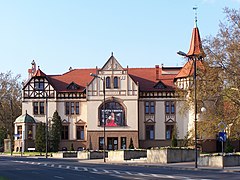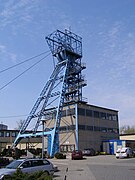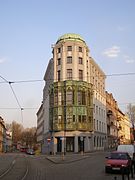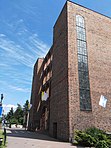Zabrze
It has been suggested that Skłodowska-Curie District be merged into this article. (Discuss) Proposed since September 2024. |
Zabrze
Zŏbrze (Silesian) | |
|---|---|
 Ulica Wolności (Liberty Street) | |
| Coordinates: 50°18′09″N 18°46′41″E / 50.30250°N 18.77806°E | |
| Country | |
| Voivodeship | Silesian |
| County | city county |
| Established | thirteenth century |
| City rights | 1922 |
| Government | |
| • City mayor | Agnieszka Rupniewska[2] (nonpartisan/KO[3]) |
| Area | |
• City | 80.40 km2 (31.04 sq mi) |
| Population (31 December 2021) | |
• City | 168,946 |
| • Density | 2,140/km2 (5,500/sq mi) |
| • Urban | 2,746,000 |
| • Metro | 4,620,624 |
| Demonym(s) | zabrzanin (male) zabrzanka (female) (pl) |
| Time zone | UTC+1 (CET) |
| • Summer (DST) | UTC+2 (CEST) |
| Postal code | 41–800 to 41–820 |
| Area code | +48 32 |
| Car plates | SZ |
| Primary airport | Katowice Airport |
| Highways | |
| Website | https://www.um.zabrze.pl |
Zabrze (Polish pronunciation: [ˈzabʐɛ] ⓘ; German: 1915–1945: Hindenburg O.S., full form: Hindenburg in Oberschlesien, Silesian: Zŏbrze, Yiddish: זאַבזשע, romanized: Zabzhe) is an industrial city in Silesia in southern Poland, near Katowice. It lies in the western part of the Metropolis GZM, a metropolis with a population of around 2 million. It is in the Silesian Highlands, on the Bytomka River, a tributary of the Oder.
Zabrze is located in the Silesian Voivodeship. It is one of the cities composing the 2.7 million inhabitant conurbation referred to as the Katowice urban area, itself a major centre in the greater Katowice-Ostrava metropolitan area which is populated by just over five million people.[4] The population of Zabrze as of December 2021 was 168,946, down from June 2009 when the population was 188,122.[1] Zabrze is bordered by three other cities of the metropolitan area: Gliwice, Bytom and Ruda Śląska.
History
[edit]Early history
[edit]
| Year | Pop. | ±% |
|---|---|---|
| 1950 | 128,005 | — |
| 1960 | 188,800 | +47.5% |
| 1970 | 197,300 | +4.5% |
| 1980 | 196,000 | −0.7% |
| 1990 | 201,400 | +2.8% |
| 2000 | 197,111 | −2.1% |
| 2010 | 186,913 | −5.2% |
| 2020 | 170,924 | −8.6% |
| source [5] | ||
Biskupice, which is now a subdivision of Zabrze, was first mentioned in 1243 as Biscupici dicitur cirka Bitom[citation needed]. Zabrze (or Old Zabrze) was mentioned in 1295–1305 as Sadbre sive Cunczindorf (German for Konrad/Kunze's village; sive = "or"). According to historical sources, mining in Zabrze dates back to the 13th century.[6] The present-day districts of Mikulczyce and Rokitnica were locations of motte-and-bailey castles from the 13th-15th century, which are now archaeological sites.[7][8] In the 1970s, archaeologists discovered an Epipalaeolithic flintwork and flint tools from the Mesolithic at the Mikulczyce archaeological site.[7] In the Late Middle Ages, the local Silesian Piast dukes invited German settlers into the territory, resulting in increasing German settlement[citation needed]. The settlement was part of the Silesian duchies of fragmented Poland. Zabrze became part of the Habsburg monarchy in 1526. In 1645, along with the Duchy of Opole, Zabrze returned to Polish rule under the House of Vasa, in 1666 it fell back to the Habsburgs, and was later annexed by the Kingdom of Prussia during the Silesian Wars[citation needed]. In 1774, the Dorotheendorf settlement was founded. In 1791, a coking coal seam was discovered in Zabrze, and then its first coking coal mine was opened.[6] In the 19th century, new coal mines, steelworks, factories and a power plant were created. A road connecting Gliwice and Chorzów and a railway connecting Opole and Świętochłowice were led through Zabrze.
Early 20th century
[edit]In 1905, the Zabrze commune was formed by the former communes Alt-Zabrze, Klein-Zabrze and Dorotheendorf. The Zabrze commune was renamed Hindenburg in 1915 in honour of Generalfeldmarschall Paul von Hindenburg. The name change was approved by Emperor Wilhelm II on 21 February 1915.[9] Up until then, it was one of the few cities whose Polish name was retained during German rule.
In 1904 the "Sokół" Polish Gymnastic Society in Zabrze was established, which was also a Polish patriotic and pro-independence organization.[10] As a result of the Prussian harassment it was liquidated in 1911, but it was reactivated twice, in 1913 and 1918.[11][10] Its members took an active part in the post-war plebiscite campaign and the Silesian uprisings.[10]
Interwar period
[edit]
During the plebiscite held after World War I, 21,333 inhabitants (59%) of the Hindenburg commune voted to remain in Germany, while 14,873 (41%) voted for incorporation to Poland, which just regained its independence.[9] In May 1921 the Third Silesian Uprising broke out and Hindenburg was captured by Polish insurgents, who held it until the end of the uprising.[9] When Upper Silesia was divided between Poland and Germany in 1921, the Hindenburg commune remained in Germany, while the present-day districts of Kończyce, Makoszowy and Pawłów were reintegrated with Poland.[9] It received its city charter in 1922. Just five years after receiving city rights Hindenburg became the biggest city in German-ruled western Upper Silesia and the second biggest city in German-ruled Silesia after Wrocław (then Breslau). Nevertheless, various Polish organizations still operated in the city in the interbellum, including a local branch of the Union of Poles in Germany,[12] Polish libraries, sports clubs, credit unions, choirs, scout troops and an amateur theater.[13] Polish newspaper Głos Ludu was published in the city.[14] In a secret Sicherheitsdienst report from 1934, Zabrze was named one of the main centers of the Polish movement in western Upper Silesia.[15] In terms of religion, most of the city's population adhered to the Catholic Church.[16]
In the 1920s, the communists, Christian democrats and nationalists enjoyed the greatest support among the German population, while Poles supported Polish parties.[17] In 1924 the Communist Party of Germany won the local elections and proposed changing the name of the city to Leninburg.[18] In 1928, among the largest cities in western Upper Silesia, Polish parties received the most votes in Zabrze.[13] In the March 1933 elections, most of the citizens voted for the Nazi Party, followed by Zentrum and the Communist Party. Nazi politician Max Fillusch became the city's mayor and remained in the position until 1945.[19]

The anti-Polish organization Bund Deutscher Osten was very active in the city, it dealt with propaganda, indoctrination and espionage of the Polish community, as well as denouncing Poles to local authorities.[20] When, the Barbórka (traditional holiday of miners) church services were organized separately for Poles and Germans in 1936, the Polish service enjoyed a greater attendance,[21] however, due to Nazi oppression and propaganda, the attendance at Polish services in the 1930s gradually decreased, according to Bund Deutscher Osten.[22] Polish activists were increasingly persecuted since 1937.[12] People were urged to Germanise their names, Polish inscriptions were removed from tombstones.[20] Some Polish priests were expelled from the city, both before[23] and during World War II.[24] As a result of German persecution the Jewish community dropped from 1,154 people in 1933 to 551 in 1939, and its remainder was deported to concentration camps in 1942.[16] The town's synagogue, that had stood since 1872, was destroyed in the Kristallnacht pogroms of November 1938.[25]
World War II
[edit]During World War II, in 1941 the German administration requisitioned church property, in which it removed Polish symbols and memorabilia.[26] Church bells were confiscated for war purposes in 1942.[27] The Germans established three forced labour subcamps of the Stalag VIII-B/344 prisoner-of-war camp in the city, two of which operated in the local coal mines,[28] and also a subcamp of Auschwitz III was located there. Another subcamp of Stalag VIII-B/344 (E51) was operated at a coal mine in the present-day Mikulczyce district.[28]
On 24 January 1945, the Soviets captured the city, then committed a massacre of some 100 inhabitants,[29] and later deported some inhabitants to the Soviet Union, while other inhabitants were expelled west in accordance to the Potsdam Agreement. However, in stark contrast to the other cities in the so-called Recovered Territories, three quarters of the mostly bilingual inhabitants were spared expulsion.[30]
Contemporary history
[edit]
Following World War II, according to the Potsdam Agreement the city was handed over to Poland in 1945 and the town's name was changed to the historic Zabrze on 19 May 1945. The first post-war mayor of Zabrze was Paweł Dubiel, pre-war Polish activist and journalist in Upper Silesia, prisoner of the Dachau and Mauthausen concentration camps during the war.[31] The pre-war Polish inhabitants of the region, who formed the majority of the city's population in 1948,[32] were joined by Poles expelled from former eastern Poland annexed by the Soviet Union. Moreover, Polish settlers from the central part of Poland also settled in Zabrze.
The city limits were largely expanded in 1951, by including Mikulczyce, Rokitnica, Grzybowice, Makoszowy, Kończyce and Pawłów as new districts.[32] New neighbourhoods were built from the 1950s to 1990s.[32] In 1948, Górnik Zabrze football club was founded, which won its first Polish championship in 1957, and soon became the pride of the city as one of the most successful clubs in Poland. Zabrze was administratively part of the Katowice Voivodeship until 1998.
Administrative division
[edit]
On 17 September 2012, the Zabrze city council decided on a new administrative division of the city. Zabrze was subsequently divided into 15 districts and 3 housing estates.[33]
- 1. Helenka
- 2. Grzybowice
- 3. Rokitnica
- 4. Mikulczyce
- 5. Młody Górnik estate
- 6. Mikołaj Kopernik estate
- 7. Biskupice
- 8. Maciejów
- 9. Tadeusz Kotarbiński estate
- 10. Centrum Północ
- 11. Centrum Południe
- 12. Guido
- 13. Zaborze Północ
- 14. Zaborze Południe
- 15. Pawłów
- 16. Kończyce
- 17. Makoszowy
- 18. Zandka
Infrastructure
[edit]The Polish north–south A1 and east–west A4 motorways, which are parts of the European routes E75 and E40, respectively, run through Zabrze, and their junction is located just outside the city limits. In addition the Polish National roads 78, 88 and 94 also run through the city. The Drogowa Trasa Srednicowa leads through the town.
Culture and sights
[edit]Among the cultural institutions of the town are the Zabrze Philharmonic and Teatr Nowy ("New Theatre"). Dom Muzyki i Tańca ("House of Music and Dance") indoor arena is located in Zabrze. The local museums are the Coal Mining Museum, the Municipal Museum and the Military Technology Museum. The Maciej mine shaft and the Main Key Adit (Główna Kluczowa Sztolnia Dziedziczna), one of the longest such structures in Europe, are open for tourists. The historic coal mines of Zabrze are listed as a Historic Monument of Poland.[34]
Among the historical architecture there are many industrial facilities, as well as various churches, houses, public buildings, etc. Important monuments of architecture were built the Expressionist and modernist styles, eg. the Admiralspalast Hotel (1924-1927), housing estate on Słowiański Square (1927-1928) and St Joseph's Church (1930-1931, designed by Dominikus Böhm). There are also numerous monuments referring to the history of the city, especially the Silesian uprisings fought here and World War II.
There is also a botanical garden and several parks in Zabrze.
-
Coal Mining Museum
-
New Theatre
-
Main post office
-
Regional Court in Zabrze
-
Maciej mine shaft
-
Guido mine shaft
-
Main Key Adit
-
Admiralspalast Hotel
-
Housing estate on Słowiański Square
-
St Joseph's Church
-
Botanical garden
Politics
[edit]Members of Parliament (Sejm) elected from Bytom/Gliwice/Zabrze constituency
- Chojnacki Jan, SLD-UP
- Dulias Stanisław, Samoobrona
- Gałażewski Andrzej, PO
- Janik Ewa, SLD-UP
- Kubica Józef, SLD-UP
- Martyniuk Wacław, SLD-UP
- Okoński Wiesław, SLD-UP
- Szarama Wojciech, PiS
- Szumilas Krystyna, PO
- Widuch Marek, SLD-UP
Sports
[edit]
The city's most renown sports team is Górnik Zabrze, one of the most accomplished Polish football clubs, 14 times Polish champions, 6 times Polish Cup winners, and 1969–70 European Cup Winners' Cup runners-up, as the only Polish team to reach the final stage of a major European football competition. Other popular team is NMC Górnik Zabrze, two times Polish men's handball champions and three times Polish Cup winners. Both teams compete in the national top leagues, the Ekstraklasa and Superliga respectively.
Many sportspeople were born in Zabrze, including footballers Jerzy Gorgoń, Łukasz Skorupski and Adam Bodzek, and pro ice hockey player of the National Hockey League, Wojtek Wolski.
Economy
[edit]Like other towns in this populous region, it is an important manufacturing centre, having coal-mines, iron, wire, glass, chemical and oil works, and local Upper Silesia Brewery, etc.
Notable people
[edit]


- James Kleist (1873–1949), German-American Jesuit scholar
- Heinz Fiebig (1897–1964), Wehrmacht general
- Jerzy Gorgoń (born 1949), Polish former football player
- Fritz Katz (1898–1969), pioneer of adrenal transplants
- Wolfgang Jörchel (1907–1945), Standartenführer in the Waffen SS
- Władysław Turowicz (1908–1980), Polish-Pakistani military scientist
- Vinzent Porombka (1910-1975), Communist activist
- Fritz Laband (1925–1982), German footballer
- Werner Heiduczek (1926–2019), German author
- Friedrich Nowottny (born 1929), German television journalist
- Janosch (born 1931), German author
- Joachim Kroll (1933–1991), German serial killer
- Joachim Kerzel (born 1941), German actor
- Jan Sawka (1946–2012), Polish-American artist, architect
- Krystian Zimerman (born 1956), Polish classical pianist
- Waldemar Sorychta (born 1967), Polish heavy metal musician and producer
- Sebastian Kawa (born 1972), Polish glider pilot, sixteen-time World Champion
- Czesław Śpiewa, (born 1979), Polish singer
- Wojtek Wolski (born 1986), Polish-Canadian ice-hockey player.
- Margarete Stokowski (born 1986), Polish-German writer
- Bartosz Bednorz (born 1994), Polish volleyball player
- The Dumplings (born 1996-1997), Polish electropop duo
- Damian Michał Heinisch (born 1968), Polish-German-Norwegian photographer
International relations
[edit]Consulates
[edit]There is an Honorary Consulate of Armenia in Zabrze.[35] There is a khachkar in Zabrze commemorating the Armenian–Polish friendship.[36]
Twin towns – sister cities
[edit]References
[edit]- ^ a b "Local Data Bank". Statistics Poland. Retrieved 24 July 2022. Data for territorial unit 2478000.
- ^ "Prezydent Miasta – Urząd Miejski w Zabrzu". 13 August 2020.
- ^ "RUPNIEWSKA Agnieszka Małgorzata – Kandydatka na Prezydenta Miasta Zabrze".
- ^ European Spatial Planning Observation Network (ESPON) [1] Archived 28 July 2009 at the Wayback Machine
- ^ "Zabrze (śląskie) » mapy, nieruchomości, GUS, noclegi, szkoły, regon, atrakcje, kody pocztowe, wypadki drogowe, bezrobocie, wynagrodzenie, zarobki, tabele, edukacja, demografia".
- ^ a b Agata Mucha. "Zespół zabudowy dawnej Kopalni "Królowa Luiza"". Zabytek.pl (in Polish). Retrieved 25 July 2021.
- ^ a b Michał Bugaj. "Grodzisko stożkowate (Mikulczyce)". Zabytek.pl (in Polish). Retrieved 25 July 2021.
- ^ Michał Bugaj. "Grodzisko stożkowate (Rokitnica)". Zabytek.pl (in Polish). Retrieved 25 July 2021.
- ^ a b c d Historia – Hindenburg Archived 1 May 2019 at the Wayback Machine at the official website of Zabrze
- ^ a b c "Polskie Towarzystwo Gimnastyczne "Sokół" w Zabrzu, Historia Zabrza". 31 July 2016. Retrieved 10 June 2019.
- ^ Encyklopedia powstań śląskich, Instytut Śląski w Opolu, Opole, 1982, p. 637
- ^ a b Cygański 1984, p. 24.
- ^ a b Rosenbaum & Węcki 2010, p. 74.
- ^ Rosenbaum & Węcki 2010, p. 124.
- ^ Rosenbaum & Węcki 2010, p. 60.
- ^ a b Rosenbaum & Węcki 2010, p. 35.
- ^ Rosenbaum & Węcki 2010, p. 53-54.
- ^ Zalega, Dariusz (2024). Chachary. Ludowa historia Górnego Śląska (in Polish). Warszawa. p. 201.
{{cite book}}: CS1 maint: location missing publisher (link) - ^ Stadtkreis Zabrze Archived 3 March 2016 at the Wayback Machine at Geschichte on Demand website
- ^ a b Rosenbaum & Węcki 2010, p. 50.
- ^ Rosenbaum & Węcki 2010, p. 130.
- ^ Rosenbaum & Węcki 2010, p. 157.
- ^ Cygański 1984, p. 26.
- ^ Rosenbaum & Węcki 2010, p. 100.
- ^ Ghetto Fighters' House archives, Photo No. 55805: a memorial monument placed by the Zabrze municipality in 1998 to commemorate its Jewish community.
- ^ Rosenbaum & Węcki 2010, p. 102.
- ^ Rosenbaum & Węcki 2010, p. 105.
- ^ a b "Working Parties". Stalag VIIIB 344 Lamsdorf. Archived from the original on 29 October 2020. Retrieved 25 March 2020.
- ^ Hanich, Andrzej (2012). "Losy ludności na Śląsku Opolskim w czasie działań wojennych i po wejściu Armii Czerwonej w 1945 roku". Studia Śląskie (in Polish). LXXI. Opole: 216. ISSN 0039-3355.
- ^ Dawid Smolorz. "Fußballegende mit deutsch-polnischem Hintergrund". Kulturkorrespondenz östliches Europa (in German) (1441): 30.
- ^ "Dubiel Paweł Mikołaj (1902–1980)". Biblioteka Sejmowa (in Polish). Retrieved 25 March 2020.
- ^ a b c "Okres powojenny". Urząd Miasta Zabrze (in Polish). Archived from the original on 1 May 2019. Retrieved 25 March 2020.
- ^ Zestawienie liczby mieszkańców z uwzględnieniem podziału na dzielnice na dzień: 30-09-2013[permanent dead link].
- ^ Rozporządzenie Prezydenta Rzeczypospolitej Polskiej z dnia 14 lipca 2020 r. w sprawie uznania za pomnik historii "Zabrze - zespół zabytkowych kopalni węgla kamiennego", Dz. U., 2020, No. 1288
- ^ "Misje dyplomatyczne, urzędy konsularne i organizacje międzynarodowe w Polsce". Portal Gov.pl (in Polish). Retrieved 20 September 2024.
- ^ "Chaczkar w Zabrzu". Awedis (in Polish). No. 55. 2023. p. 3.
- ^ "Miasta partnerskie i zaprzyjaźnione". um.zabrze.pl (in Polish). Zabrze. Archived from the original on 21 September 2019. Retrieved 11 March 2020.
Bibliography
[edit]- Cygański, Mirosław (1984). "Hitlerowskie prześladowania przywódców i aktywu Związków Polaków w Niemczech w latach 1939 – 1945". Przegląd Zachodni (in Polish) (4).
- Rosenbaum, Sebastian; Węcki, Mirosław (2010). Nadzorować, interweniować, karać. Nazistowski obóz władzy wobec Kościoła katolickiego w Zabrzu (1934–1944). Wybór dokumentów (in Polish). Katowice: IPN. ISBN 978-83-8098-299-4.
External links
[edit]- Municipal website (in Polish)
- Zabrze Community (in Polish)
- Portal Zabrze.com.pl (in Polish)
- Encyclopædia Britannica Zabrze
- Jewish Community in Zabrze on Virtual Shtetl




















